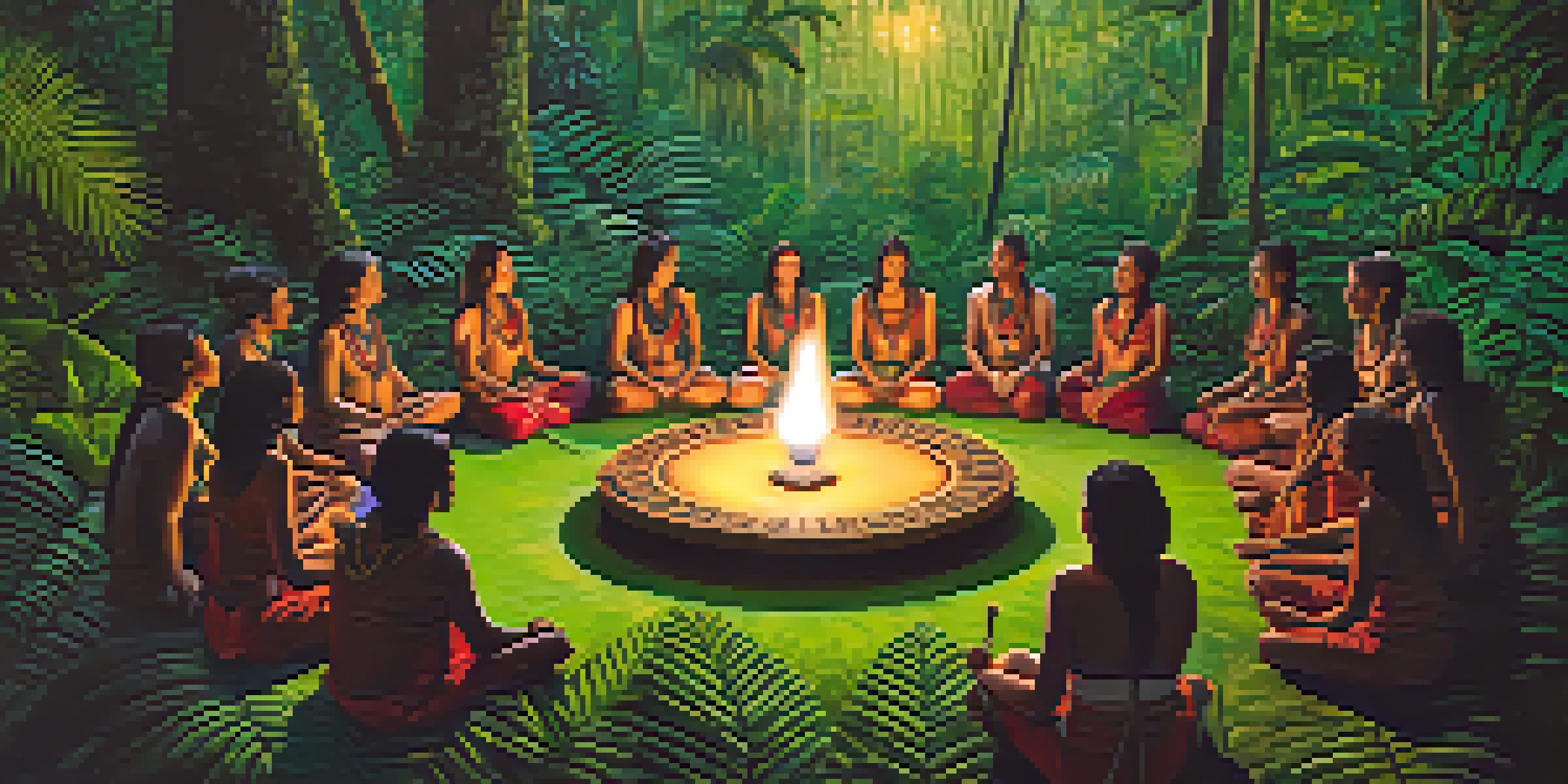The Impact of Ayahuasca on Global Healing Movements Today

Understanding Ayahuasca: A Brief Overview
Ayahuasca is a psychoactive brew made from the Banisteriopsis caapi vine and other plants. Traditionally used by indigenous tribes in the Amazon, it has gained popularity worldwide for its potential to facilitate deep psychological and spiritual healing. The brew induces altered states of consciousness, leading many to profound insights and emotional catharsis. This unique experience has piqued the interest of those seeking alternative healing methods.
The use of Ayahuasca is about the experience, the healing, and the community that surrounds it.
In recent years, the Western world has seen a surge in interest in Ayahuasca, with retreats popping up in countries far from its origins. This growing fascination can be attributed to a broader search for holistic and integrative approaches to mental health. People are drawn to Ayahuasca not only for its effects but also for the communal and ritualistic aspects of the ceremonies. These elements foster a sense of belonging and shared experience that many find lacking in conventional therapy.
While Ayahuasca offers potential benefits, it's essential to approach it with respect and understanding. Not everyone is suited for this powerful brew, and proper guidance is crucial. As we explore its impact on global healing movements, it's vital to acknowledge both the positive outcomes and the challenges that come with its increasing popularity.
The Rise of Ayahuasca Retreats Worldwide
With its growing reputation, Ayahuasca retreats have become a trend across the globe. These retreats often promise transformative experiences, attracting individuals seeking relief from depression, anxiety, or trauma. Many participants report significant personal breakthroughs during their sessions, which have sparked interest in the healing potential of the brew. However, it’s important to note that experiences can vary greatly from person to person.

The retreats often take place in serene natural settings, emphasizing connection to nature as part of the healing process. This environment helps participants disconnect from their daily stressors and immerse themselves in the experience. Often, the ceremonies are led by experienced shamans who guide participants through the emotional and spiritual journeys. This guidance can be invaluable, as navigating the effects of Ayahuasca can be challenging.
Ayahuasca's Healing Potential
Ayahuasca has gained global attention for its potential to facilitate emotional healing and offer new perspectives on mental health.
Despite the positive testimonials, the rise of these retreats raises questions about cultural appropriation and ethical practices. It's crucial for participants to seek retreats that honor the traditions and knowledge of the indigenous cultures that have used Ayahuasca for centuries. Finding a balance between sharing this powerful medicine and respecting its roots is essential for maintaining its integrity.
Ayahuasca and Mental Health: A New Perspective
Research into Ayahuasca's effects on mental health is still in its infancy, but early studies show promising results. Participants have reported reductions in symptoms of PTSD, depression, and anxiety following Ayahuasca ceremonies. The brew seems to facilitate emotional release and provides individuals with new perspectives on their experiences. For many, this can lead to lasting changes in outlook and behavior.
Psychedelics can open the door to the healing of trauma, grief, and emotional pain.
Unlike traditional antidepressants, which can take weeks to show effects, many users claim to feel immediate relief after an Ayahuasca session. This rapid response is attributed to the brew's ability to catalyze deep emotional processing. Additionally, the communal aspect of the ceremonies can foster support and connection, which are vital for mental health recovery. This combination of factors makes Ayahuasca an intriguing option in the discussion of mental health treatments.
However, it's crucial to approach this option with caution and thorough understanding. While individual experiences can be transformative, Ayahuasca is not a panacea. It’s essential for anyone considering this path to conduct thorough research and consult with mental health professionals to ensure a safe and informed journey.
Cultural Significance of Ayahuasca in Indigenous Communities
For indigenous communities in the Amazon, Ayahuasca is more than just a brew; it's a sacred medicine embedded in their cultural and spiritual practices. The use of Ayahuasca is deeply intertwined with their worldview, serving as a bridge between the physical and spiritual realms. Shamans play a vital role in these communities, acting as healers and guides during ceremonies, which are steeped in tradition and respect for the plant's power.
These indigenous practices emphasize the importance of connection—both to nature and to one another. The communal aspect of Ayahuasca ceremonies fosters a sense of belonging and shared purpose, which is often transformative for participants. This cultural framework contrasts sharply with the often individualistic approach of Western medicine, highlighting the value of community in the healing process.
Cultural Respect is Essential
As interest in Ayahuasca grows, it is crucial to honor and respect the indigenous cultures that have traditionally used this sacred brew.
As Ayahuasca gains popularity outside its indigenous roots, there's a growing concern about the commodification of this sacred practice. It's essential to honor and respect the traditions of the cultures that have used Ayahuasca for generations. Fostering dialogue and collaboration between indigenous communities and those seeking healing can help preserve the integrity and significance of Ayahuasca.
Ayahuasca's Influence on Global Healing Movements
The impact of Ayahuasca extends beyond individual healing; it has become a catalyst for broader global healing movements. As more people share their transformative experiences, Ayahuasca's role in healing is being recognized within the wellness community. Many are advocating for its inclusion in holistic health practices, which often emphasize the interconnectedness of mind, body, and spirit.
This shift is encouraging a more open-minded approach to alternative healing methods, leading to a growing acceptance of psychedelics in therapeutic settings. The conversations around Ayahuasca are helping to destigmatize the use of psychedelics for mental health treatment. As societal attitudes change, more research is being conducted to understand the potential benefits and risks associated with these substances.
Ultimately, Ayahuasca's influence on global healing movements signals a shift towards integrating ancient wisdom with modern health practices. This blending of perspectives can enrich our understanding of healing and offer new pathways for those seeking relief from psychological distress.
Challenges and Risks of Ayahuasca Use
While many individuals report positive outcomes from Ayahuasca experiences, it's important to acknowledge potential risks and challenges. The intense emotional and psychological effects of Ayahuasca can be overwhelming, and not everyone is prepared for the journey it entails. Some individuals may experience difficult emotions or confront traumatic memories during their sessions, which can be distressing without proper support.
Additionally, there are physical risks associated with Ayahuasca consumption, especially when combined with certain medications. The brew can interact dangerously with antidepressants or other substances, leading to adverse effects. Therefore, it's crucial for participants to disclose their medical histories and consult with healthcare providers before engaging in Ayahuasca ceremonies.
Risks of Ayahuasca Use
While many report positive experiences, participants must be aware of the emotional and physical risks associated with Ayahuasca ceremonies.
Education and preparation are key to mitigating these risks. Participants should seek out reputable retreats and facilitators who prioritize safety and well-being. By fostering an informed approach, individuals can navigate the complexities of Ayahuasca with greater awareness and care.
The Future of Ayahuasca in Healing Practices
As interest in Ayahuasca and its healing properties continues to grow, its future in global healing practices looks promising yet complex. The ongoing dialogue about its role in mental health and wellness is encouraging more people to explore alternative therapies. This exploration could lead to a more inclusive approach to healing, where various traditions are respected and integrated.
However, this future also hinges on how we address ethical concerns surrounding the use of Ayahuasca. Ensuring that indigenous practices are honored and not exploited is crucial for maintaining the integrity of this sacred medicine. Collaborative efforts between indigenous leaders and modern practitioners can help create a balanced framework for the responsible use of Ayahuasca in healing.

Ultimately, the future of Ayahuasca in healing practices will depend on our ability to cultivate respect, understanding, and collaboration. By fostering a holistic approach that values both ancient wisdom and contemporary insights, we can unlock the full potential of Ayahuasca as a healing tool for individuals and communities alike.